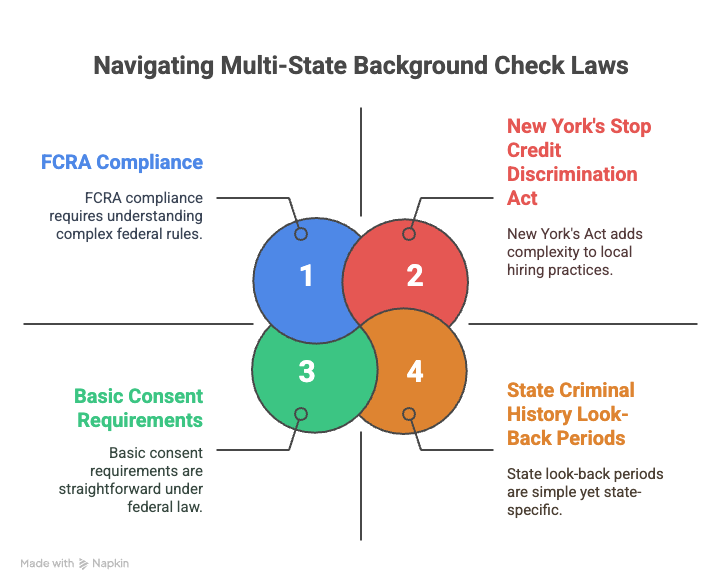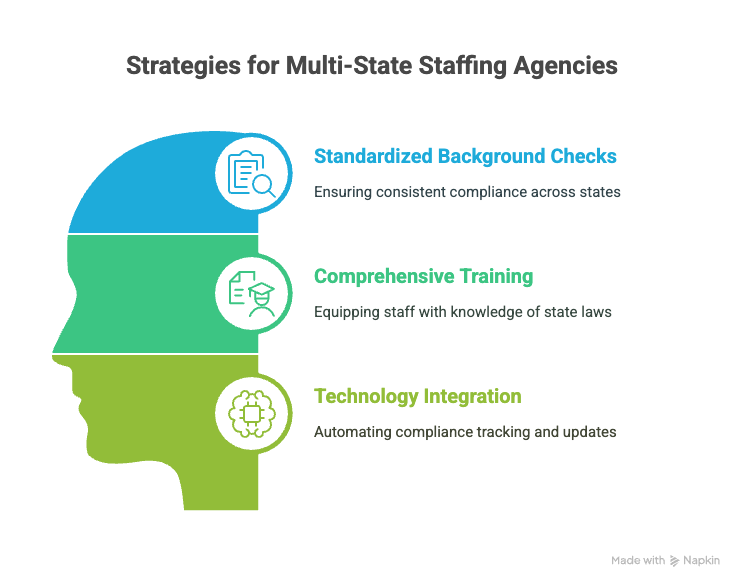Navigating the labyrinth of multi-state background check laws can be a daunting task, particularly for staffing agencies that operate across different jurisdictions. With each state offering its own twist on the rules and regulations, staying compliant is no small feat. In this guide, we'll slice through the complexity and provide staffing agencies with clear, concise strategies for managing multi-state screening in a compliant and effective manner.
Key Takeaways
- Knowing the specific state regulations for background checks is crucial to avoid legal trouble for your staffing agency.
- Salary history bans in states like California, Massachusetts, and New York require you to adjust interview processes.
- Marijuana legalization in certain states complicates drug testing policies, demanding clear communication with candidates and clients.
- Regularly updating your practices in line with the Fair Credit Reporting Act and state laws is necessary to maintain compliance.
- Utilize a mix of internal and external resources to ensure you're updated on legal changes and enhance your compliance strategy.
Introduction
Staffing agencies face a minefield of diverse state regulations. Non-compliance isn't just a hiccupâit's a financial and legal nightmare waiting to happen. The rules around multi-state background checks are anything but uniform. Some states ban inquiries about salary history, others have distinct marijuana testing laws. For you, this means knowing not just the federal guidelines, but also the specific laws where your candidates live and work.
Multi-state background check laws cover everything from credit reports to criminal history, influenced by frameworks like the Fair Credit Reporting Act (FCRA) and various state mandates. Your ability to navigate this regulatory maze not only safeguards your agency, but it also establishes trust and credibility with clients and candidates.
This guide boils down the complex rules into a straightforward strategy to handle these challenges effectively. Ready to streamline your approach and keep your agency in the clear? Let's cut through the noise and clarify what it takes to navigate these laws.
Understanding Multi-State Background Check Laws
Multi-state background check laws encompass a blend of federal regulations, state-specific statutes, and local ordinances. The Fair Credit Reporting Act (FCRA) often serves as the backbone, setting the ground rules for how background information can be collected and used. It covers basics like obtaining the candidate's consent and outlining rights concerning their credit report. However, states and even cities can interpret and extend these regulations in unique ways, adding layers of complexity.
Each state brings its own legal nuances. For example, some states restrict how far back you can look into a candidate's criminal history, while others focus on what types of information can be requested. Cities like New York have their own stringent guidelines, such as the Stop Credit Discrimination in Employment Act, which limits the use of credit history in hiring decisions. Not knowing these specifics can land staffing agencies in legal trouble, ranging from minor infractions to costly lawsuits.
Understanding the divergences between state and federal regulations is crucial. For instance, the FCRA may allow a seven-year look-back period for criminal convictions, but states like California or Massachusetts impose additional restrictions. Agencies must not only grasp these differences but also implement procedures to ensure they comply in every location where they operate. This requires vigilance and ongoing education.

Do you have a system to track these differences and updates across various jurisdictions? The goal is to avoid legal pitfalls and secure your agency's reputation as a compliant, reliable partner for clients and candidates alike.
Key Considerations for Multi-State Screening
When managing multi-state screening, stay informed about diverse employment regulations. Here are critical factors to address:
- Salary History Ban States: Some states prohibit employers from asking about a candidateâs salary history. These laws aim to promote fair pay by preventing past salaries from influencing offers. States like California, Massachusetts, and New York have such bans. As a staffing agency, you must adjust your hiring practices to comply with these laws. This includes training recruiters to avoid salary history questions and revising interview templates.
- Marijuana Testing Laws: The legalization of marijuana raises unique challenges. States like Colorado and Washington have regulations around drug testing for employment purposes. You need to decide if marijuana will be part of your pre-employment drug screening and how to handle varying state laws. Consider crafting state-specific policies that respect legalization while maintaining workplace safety. Communicate these policies clearly to candidates and clients to ensure everyone is on the same page.
- FCRA Compliance Checklist: To comply with the Fair Credit Reporting Act, follow a checklist designed for staffing agencies. Start with obtaining permissible purpose before conducting checks. Provide disclosure that is clear and conspicuous, separate from other application materials. Ensure candidates give written consent. If you plan to take adverse action based on the report, follow proper procedures. This involves giving candidates a copy of their report and a summary of rights before a final decision. Staying meticulous here reduces the risk of legal issues, safeguarding your agency and clients.
Navigating State-Specific Regulations
Every state has its own approach to handling background checks, and this can create a logistical puzzle for staffing agencies. Let's consider a few states with standout regulations to illustrate the complexity and offer some guidance.
Take California, for example. It has stringent rules regarding personal data and privacy. Agencies must comply with the California Consumer Privacy Act (CCPA), which gives residents the right to know what personal data is collected and how it's used. Not providing this transparency can land you in administrative trouble. Meanwhile, in New York, you face unique disclosure requirements related to criminal records. New York law demands that any records used in hiring decisions must be directly relevant to the job in question.
How do you keep compliant across these varied legal environments? One strategy involves tailoring your processes to each state. Look at Massachusetts, which prohibits the use of credit history in employment decisions. An agency must adjust their background check processes accordingly or risk violating anti-discrimination laws.
Staying current with changes is another challenge. Laws evolve, and a set-it-and-forget-it approach will leave you vulnerable. Subscribe to reliable legal update services or work with legal advisors specializing in employment law. They can alert you to changes and help refine your strategies.
Streamlining compliance isn't just about following the lawâit's about using the right tools. Compliance software can track different state laws and help you maintain accurate records. Some systems can automate alerts when regulations change, ensuring you never miss crucial updates.
Balancing these varied requirements seems daunting, but with a nuanced and informed approach, you can effectively manage multi-state screening regulations. Ensure your team is equipped with the right knowledge and tools, and your agency will thrive in this complex landscape.
Best Practices

Successful multi-state staffing agencies prioritize creating a standardized process for background checks. You need a process that adapts to each state's regulations while maintaining consistency in quality and compliance. Draft templates that accommodate common requirements and tweak them for state-specific laws. This balance helps avoid compliance pitfalls and ensures smooth operations.
Training and development play a crucial role in maintaining compliance. Equip your team with comprehensive knowledge of different state laws through regular training sessions. Encourage ongoing education to keep everyone updated on new legal developments. Well-informed staff are more likely to identify and address issues before they become problems.
Leverage technology to streamline compliance. Use software solutions to automate tracking changes in laws, reducing the likelihood of errors. Reliable tools can integrate with legal databases, providing your team with real-time updates and resources. This not only ensures compliance but also saves time and reduces administrative burdens.
Additional Resources
Leveraging the right resources is crucial for effective compliance in multi-state operations. Start by utilizing your internal resources. Your internal compliance team and legal department are valuable assets. They have a direct understanding of your processes and can offer tailored advice. Encourage them to regularly review state laws and update protocols accordingly.
Also, maintain a repository of reliable information within your organization. This could include policy documents, compliance checklists, and a central database of state-specific regulations that your team can access easily.
On the other hand, external resources should not be overlooked. The Department of Labor website is a great starting point for understanding general hiring regulations. External legal advisors, especially those specializing in employment law across states, can provide insights that internal teams might miss. These experts are often updated more quickly on legislative changes, offering a proactive edge.
Partnerships with compliance-focused technology providers can also be beneficial. Many firms offer software solutions that automate the tracking of law changes and integrate with legal resources, reducing manual effort and minimizing errors.
It's important to strike a balance between using internal resources for routine processes and external ones for specialized insights. This not only improves compliance but also enhances operational efficiency in handling multi-state employment screenings. Are you utilizing a diverse mix of resources to stay ahead? If not, consider diversifying your approach to reinforce your compliance strategy.
Conclusion
Summarizing the earlier discussion, multi-state screening laws present unique challenges for staffing agencies. We've explored strategies to navigate these complexities, emphasizing comprehension of diverse legal frameworks and the importance of FCRA adherence. Address the salary history bans and marijuana testing nuances to ensure your agency meets local requirements. Use standardized processes and technology to streamline compliance efforts. Regularly update your practices to align with legal changes, leveraging both internal and external resources.
Compliance isnât just about avoiding finesâit's a chance to build your agency's reputation. A robust, compliant process attracts diverse talent and instills trust in both clients and candidates. Make a habit of reviewing your procedures regularly. Not only should you meet legal standards, but aim to exceed them. Lead the industry by example, setting a benchmark for what compliance can be.
Frequently Asked Questions (FAQs)
Which states have ban-the-box laws for staffing agencies?
Many states, including California, New York, and Illinois, have ban-the-box laws. Staffing agencies in these states cannot ask applicants about their criminal history on initial job applications.
Can staffing agencies ask about salary history in all states?
No, several states, like Massachusetts and New York, have laws preventing employers, including staffing agencies, from asking about salary history.
How does marijuana legalization affect drug testing policies?
Legalization varies by state, affecting employer rights on testing. Some states, such as Nevada, limit the ability of employers to consider positive marijuana test results.
What are the penalties for violating FCRA in multiple states?
Violations of the Fair Credit Reporting Act can result in fines and legal actions. Penalties include statutory damages up to $1,000 per violation, plus attorney fees and costs.
How to automate multi-state compliance for background checks?
Utilize compliance software that tracks differing state laws and updates automatically. This helps ensure your processes align with each stateâs requirements.
What questions can staffing agencies legally ask during an initial interview?
They can inquire about qualifications, job experience, and skills relevant to the position. Questions about race, religion, or marital status are prohibited.
Are there states that require notification before a background check?
Yes, the FCRA mandates notifying applicants in all states. Some states, like California, have additional requirements, including providing a copy of the report.
How do state-specific privacy laws impact background checks?
Certain states, including California, have strict privacy laws that affect what data can be collected and how it's disclosed. Staying updated with these laws is crucial.
Can employers apply the same drug testing policy across all states?
No, differences in state laws require tailored drug testing policies. Some states have restrictions due to marijuana legalization or other factors.
What should agencies do if discrepancies surface in a background check?
They should follow the FCRA's adverse action process, notify the applicant, and provide a copy of the report and FCRA summary of rights. This allows applicants to dispute errors.
Definitions
Fair Credit Reporting Act (FCRA)
The FCRA is a federal law that regulates how consumer information, including background checks, is collected and used during the hiring process. It requires staffing agencies to get written consent from candidates before a background check. It also ensures candidates receive a copy of their report and a summary of their rights if adverse action is being considered. This law sets the minimum standard, but states can add stricter rules.
Salary History Ban
This law prohibits employers in certain states from asking applicants about their past salary. The goal is to reduce pay gaps by preventing past compensation from influencing new offers. States like California, New York, and Massachusetts enforce this rule. Agencies must train staff to avoid salary history questions and adjust offers based on role requirements, not prior earnings.
Marijuana Testing Laws
These are state-specific rules that govern whether and how employers can test for marijuana use. In places like Colorado and Washington, where recreational use is legal, testing practices may need to shift. Some states limit or ban pre-employment marijuana screening. Agencies should tailor their policies based on where the candidate lives and where the job is located.
Background Check
A background check involves reviewing a candidate's history, including criminal records, credit reports, and employment history. Different states limit how far back you can search or what data you can use. For example, some states prevent the use of arrest records without convictions. Staffing agencies must apply the right standards based on both federal law and local rules.
Compliance
Compliance means following all laws and guidelines related to employment practices. For staffing agencies, this includes aligning hiring procedures with the FCRA, tracking individual state requirements, and adjusting processes as laws change. Staying compliant reduces legal risks and helps establish credibility with clients and candidates.
References
- https://fadv.com/blog/background-checks-legislative-trends-to-watch-in-2025/
- https://staffingkc.com/blog/dont-forget-to-update-the-company-handbook-and-personnel-policies-for-2025/

GCheck Editorial Team
Meet the GCheck Editorial Team, your trusted source for insightful and up-to-date information in the world of employment background checks. Committed to delivering the latest trends, best practices, and industry insights, our team is dedicated to keeping you informed.
With a passion for ensuring accuracy, compliance, and efficiency in background screening, we are your go-to experts in the field. Stay tuned for our comprehensive articles, guides, and analysis, designed to empower businesses and individuals with the knowledge they need to make informed decisions.
At GCheck, we're here to guide you through the complexities of background checks, every step of the way.





